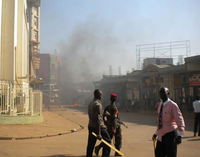
Kampala, September 13, 2009
The streets of Kampala, Uganda's Capital were filled with smoke and violence Thursday and Friday last week, as thousands of demonstrators protested the federal government's efforts to restrict the movements of the Kabaka, or king of Buganda.
Uganda has for years been considered one of the most stable and peaceful African Countries, but the capital Kampala and a wide surrounding area exploded Thursday in violent clashes as police and army units fought demonstrators protesting government efforts to restrict travel by the Kabaka, head of the traditional kingdom of Buganda.
At least 20 people have been killed and hundreds injured and arrested. The government ordered 5 radio stations closed for inciting violence including three stations owned by the Kingdom of Buganda. A popular radio talk show host was arrested and the Uganda Journalists Association said the police have been targeting and assaulting reporters covering the violence.
I witnessed some of the violence In downtown Kampala Thursday morning as demonstrations were broken up by police and soldiers. In response, demonstrators, known as Nkobazambogo, or Buganda youth vigilantes, set fires and barricades in the streets and pelted police with rocks and and bottles. Police charged and chased demonstrators down the narrow downtown streets around the taxi parks, firing teargas, and beating and clubbing demonstrators and bystanders alike. By mid-day, protests had spread widely throughout the city and the surrounding suburbs. Virtually all major roads were barricaded and traffic including busses and taxis came to a stand-still for the rest of the day. Thousands of weary workers trudged for hours in the dark to reach their homes.
The origins of the current dispute this week date back over 100 years when Buganda and three other traditional monarchies were stitched together by British colonialists to create the modern state of Uganda. The kingdoms, Buganda, Bunyoro, Toro, Busoga were allowed to keep the trappings of royalty and a shadow of statehood but with limited legal authority when the current Uganda government was formed in 1992.
The protests were sparked when President Yoweri Musevini said the government would not allow a proposed visit by the Kabaka on Saturday to the town of Kayunga. Kayunga is in an area that was taken away from Bunyoro Kingdom in the 19th century by the British, and annexed to Buganda as a reward for cooperating with the colonial rulers. Both Bunyoro and Buganda claim the area today.
I made my way home in the early evening on the back of a boda-boda, a small passenger motorcycle, a cheap, fast and often thrilling form of public transportation in Uganda. The Boda could go where cars were blocked and my driver nimbly steered us between rocks and concrete chunks stacked in the road, piles of burning trash and tires and abandoned vehicles. At several points along the way we were stopped by demonstrators and urged to offer cash contributions to the Kabaka before we could continue on our way. Vehicles that tried to pass through the barricades without stopping were pelted with rocks. As I alighted from the boda-boda, gunfire exploded less than 100 yards away, as army units crashed through a street barricade, firing their guns in the air. About two dozen demonstrators and spectators scattered and ducked for cover.
The protests brought substantial hardship to many families, even those not touched by the violence. Virtually all Shops, factories and offices closed out of fear of the spreading violence.
Jimmy Kibuuka the director of Kisa Primary School where I am a volunteer is a leader in the Democratic Party, one of three minority parties opposing the ruling NRM headed by President Museveni. He says the government is using the disturbances to harass Democratic Party leaders. Several of his DP colleagues in Nansana have been arrested in the last 2 days.
Late friday night the Kabaka insisted he was going to Kayunga the next day, and President Museveni vowed he would not. But Saturday morning the Kabaka blinked, and announced he will postpone his trip.
This defused the protests, and there was only scattered violence Saturday. Most roads were cleared and it was possible to travel in and out of the capital. But the police announced they will continue to arrest those they call leaders of the protests in the next few days. As the smoke clears in Kampala and a shaky peace returns, all the underlying tensions and conflicts remain virtually untouched, and the prospect of further confrontations remains very strong. More photos here.
